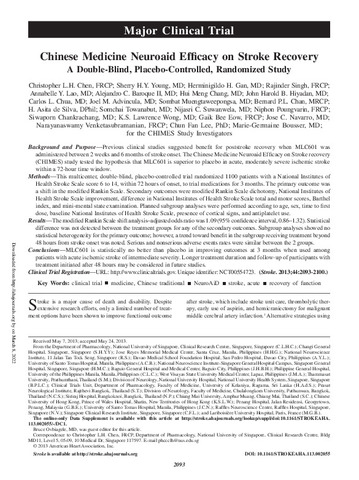| dc.contributor.author | Chen, Christopher L.H. | |
| dc.contributor.author | Young, Sherry H.Y. | |
| dc.contributor.author | Gan, Herminigildo | |
| dc.contributor.author | Singh, Rajinder | |
| dc.contributor.author | Lao, Annabelle Y. | |
| dc.contributor.author | Baroque, Alejandro C. | |
| dc.contributor.author | Chang, Hui Meng | |
| dc.contributor.author | Hiyadan, John Harold B. | |
| dc.contributor.author | Chua, Carlos L. | |
| dc.contributor.author | Advincula, Joel M. | |
| dc.contributor.author | Muengtaweepongsa, Sombat | |
| dc.contributor.author | Chan, Bernard PL | |
| dc.contributor.author | de Silva, H. Asita | |
| dc.contributor.author | de Silva, H. Asita | |
| dc.contributor.author | Suwanwela, Nijasri | |
| dc.contributor.author | Poungvarin, Niphon | |
| dc.contributor.author | Chankrachang, Siwaporn | |
| dc.contributor.author | Wong, Ka Sing Lawrence | |
| dc.contributor.author | Eow, Gaik Bee | |
| dc.contributor.author | Navarro, Jose C. | |
| dc.contributor.author | Venketasubramanian, Narayanaswamy | |
| dc.contributor.author | Lee, Chun Fan | |
| dc.contributor.author | Bousser, Marie-Germaine | |
| dc.contributor.author | | |
| dc.date.accessioned | 2024-04-23T08:12:54Z | |
| dc.date.available | 2024-04-23T08:12:54Z | |
| dc.date.issued | 2013-06-18 | |
| dc.identifier.citation | Chen C, Venketasubramanian N, Lee C, Wong K, Bousser M, Navarro J, Gan H, Lao A, Baroque A, Lokin J, Hiyadan J, Sarfati M, Fangonillo R, Ambasing N, Chua C, San Jose M, Advincula J, Berame E, Canete M, Venketasubramanian N, Young S, Mamauag M, Tay S, Pande S, Thirugnanam U, Singh R, Chang H, De Silva D, Chan B, Sharma V, Luen T, Poungvarin N, Muengtaweepongsa S, Towanabut S, Suwanwela N, Chotickanuchit S, Chankrachang S, Nitinun S, de Silva H, Ranawake U, Wijekoon N, Wong K and Eow G (2013). Chinese medicine Neuroaid efficacy on Stroke recovery. Stroke. 44(8), 2093-2100. | en |
| dc.identifier.issn | 0039-2499 | |
| dc.identifier.uri | https://hdl.handle.net/20.500.14353/358 | |
| dc.description.abstract | BACKGROUND AND PURPOSE-: Previous clinical studies suggested benefit for poststroke recovery when MLC601 was administered between 2 weeks and 6 months of stroke onset. The Chinese Medicine Neuroaid Efficacy on Stroke recovery (CHIMES) study tested the hypothesis that MLC601 is superior to placebo in acute, moderately severe ischemic stroke within a 72-hour time window.
METHODS-: This multicenter, double-blind, placebo-controlled trial randomized 1100 patients with a National Institutes of Health Stroke Scale score 6 to 14, within 72 hours of onset, to trial medications for 3 months. The primary outcome was a shift in the modified Rankin Scale. Secondary outcomes were modified Rankin Scale dichotomy, National Institutes of Health Stroke Scale improvement, difference in National Institutes of Health Stroke Scale total and motor scores, Barthel index, and mini-mental state examination. Planned subgroup analyses were performed according to age, sex, time to first dose, baseline National Institutes of Health Stroke Scale, presence of cortical signs, and antiplatelet use.
RESULTS-: The modified Rankin Scale shift analysis-adjusted odds ratio was 1.09 (95% confidence interval, 0.86-1.32). Statistical difference was not detected between the treatment groups for any of the secondary outcomes. Subgroup analyses showed no statistical heterogeneity for the primary outcome; however, a trend toward benefit in the subgroup receiving treatment beyond 48 hours from stroke onset was noted. Serious and nonserious adverse events rates were similar between the 2 groups.
CONCLUSIONS-: MLC601 is statistically no better than placebo in improving outcomes at 3 months when used among patients with acute ischemic stroke of intermediate severity. Longer treatment duration and follow-up of participants with treatment initiated after 48 hours may be considered in future studies. | en |
| dc.description.sponsorship | The CHInese Medicine NeuroAiD Efficacy on Stroke recovery (CHIMES) study was funded, in part, by the CHIMES Society, a nonprofit organization. Moleac (Singapore) provided grants and other resources to the CHIMES Society, which had sole discre-tion on use. The National Medical Research Council of Singapore provided funding (NMRC/1288/2011 and NMRC/1096/2006) to conduct this study in Singapore and for the overall coordination of the study. | en |
| dc.language.iso | en | en |
| dc.publisher | American Heart Association, Inc. | en |
| dc.relation.uri | | en |
| dc.subject | NeuroAiD | en |
| dc.subject | Poststroke recovery | en |
| dc.subject | MLC601 | en |
| dc.subject | NeuroAiD | en |
| dc.subject | Stroke unit care | en |
| dc.subject | Traditional Chinese medicine | en |
| dc.subject | CHIMES | en |
| dc.subject | ChInese Medicine NeuroAiD Efficacy on Stroke Recovery | en |
| dc.subject.lcsh | Medicine, Chinese | en |
| dc.subject.lcsh | Clinical trials | en |
| dc.subject.lcsh | Cerebrovascular disease | en |
| dc.subject.lcsh | Therapeutics | en |
| dc.subject.lcsh | Neuroprotective agents | en |
| dc.subject.mesh | Stroke | en |
| dc.subject.mesh | Ischemic Stroke | en |
| dc.subject.mesh | Thrombolytic Therapy | en |
| dc.subject.mesh | Aspirin | en |
| dc.subject.mesh | Stroke Rehabilitation | en |
| dc.title | Chinese medicine neuroaid efficacy on stroke recovery: A double-blind, placebo-controlled, randomized study | en |
| dc.type | Article | en |
| dcterms.accessRights | Open access | en |
| dc.citation.journaltitle | Stroke | en |
| dc.citation.volume | 40 | en |
| dc.citation.issue | 8 | en |
| dc.citation.firstpage | 2093 | en |
| dc.citation.lastpage | 2100 | en |
| dc.identifier.essn | 1524-4628 | |
| dc.identifier.doi | 10.1161/STROKEAHA.113.002055 | |
| local.isIndexedBy | Scopus | en |


